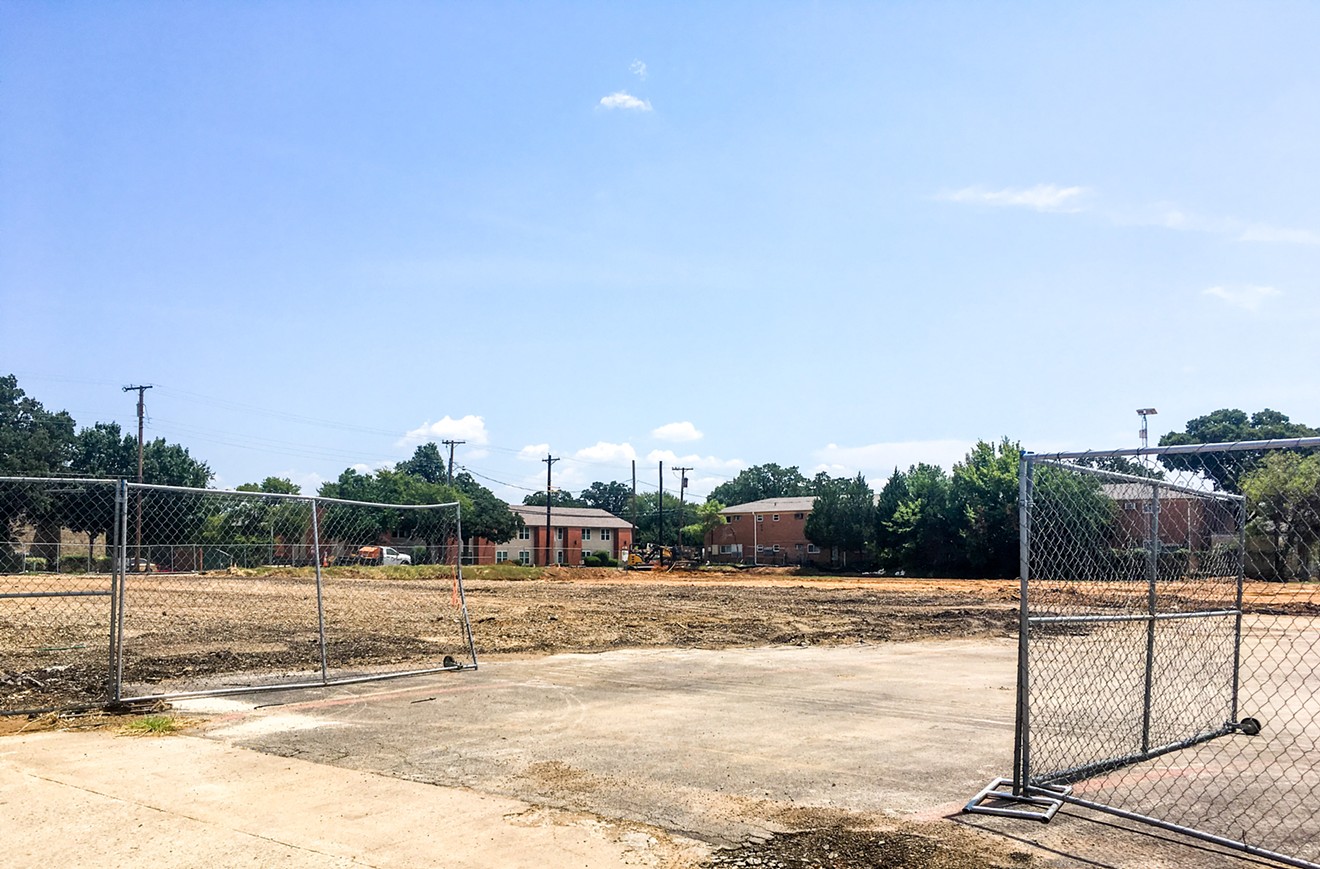“It feels like who can be stubborn for longer,” she said.
On the other side of Normal Street from her is the planned site of a 155-unit, 470-bed housing complex that Reams and others in the area worry will change drastically what is a quiet Denton neighborhood.
According to plans dated July 2018, the proposed complex would be four- and five-story contiguous units built up to the lot line, extending along Scripture Street from Normal Street to Bryant Street. Most buildings in the neighborhood are old one- and two-story homes and small apartment complexes. The sheer scale of the planned buildings is staggering and completely out of character with the neighborhood, Reams said.
Right now, the neighborhood is quiet and calm to walk through. A few cars pass slowly by Reams' house, and it's easy to find a parking spot on the street. A swath of blue sky spreads above the low trees and rooftops, and sunlight dapples her yard in the afternoon.
All of that would change with the building across the street: Her view would be mostly dumpsters and a parking garage entrance, and she would be eligible for a monthly stipend in exchange for the natural light that would be blocked out by the new building.
In 2017, Denton City Council and the Planning and Zoning Commission rejected a proposal from the same developers to rezone this property. At the hearing, dozens of community members spoke against the entire project, and committee members expressed concerns about how the building would alter the neighborhood. The rezoning rejection seemed like the end of the project, said Craig Clifton, who owns property in the neighborhood.
But last spring, a fence went up around the property, and recently, construction crews demolished the former medical facilities and houses on the lot, cleared trees and began smoothing the ground.
In January, a committee of Denton residents presented the Denton City Council with their detailed proposal for the future of the neighborhood, which was summarized on a presentation slide by Patrice Lyke, committee chair.
“A stable, walkable neighborhood in which to live, work and play, a place in which the area's historical character is celebrated and preserved while allowing opportunities for revitalization that are contextually compatible in use, scale and design,” Lyke read off a slide at the Jan. 15 City Council meeting.
The council unanimously accepted the plan. Only Denton Mayor Chris Watts voted against it.
Although the plan is not legally binding, the committee deliberated for nearly two years and believed that their recommendations were going to guide future decisions about development in the neighborhood, Reams said. Instead, she feels the committee's hard work is being ignored.
Since the committee adjourned, there has been little new information for the public, and the progress to prepare the land for construction came as a surprise, Clifton said. He worries that a complex of this size will put Denton on track to become the next Frisco or Plano, with high-rise apartment buildings, escalating property prices and traffic jams.
At a City Council meeting earlier this week, Clifton also expressed concern about a nearby well and groundwater in the area. He said construction might pollute the water supply or disturb gas lines running under the property. Gas lines damaged by construction have the potential to explode, he said.
Council members pressed for a follow-up examination of the gas lines, but the city's director of utilities, Ken Banks, told council members that he didn't think there was any risk to the water supply. On Friday, Watts said that Atmos Energy would present a report on the gas lines to a Denton City Council work session, which is open to the public but members of the public are not allowed to speak.
The lack of transparency throughout the process has been incredibly hard to take, Reams said.
“I wish they would tell me what the plan is,” she said. “There’s no clarity. I wouldn’t be so frustrated if I heard some numbers and saw the reasoning behind it … I might be complaining about something that’s off the plans,” she said."There’s no clarity. I wouldn’t be so frustrated if I heard some numbers and saw the reasoning behind it." — Vanessa Reams
tweet this
The owner/developer of the land is listed on a commercial building permit filed with the city of Denton in June as Park7 Group, a property development firm with an address in New York City. Corporation filings reveal that corporations named Park7 Group, Park7 Development and Park7 Management, in Arizona, Florida, New York and Texas, all list the same New York address as the Park7 Group, although the group is registered in New York as a “foreign corporation,” meaning it is headquartered in another state.
These corporations all appear to own single-room occupancy apartment complexes, which are multi-bedroom apartments rented by the room rather than the unit, and often used for student housing.
Park7 did not respond to requests for comment from the Dallas Observer.
Although there are a number of single-room occupancy complexes around UNT, which are mostly used for off-campus student housing, one of this size concerns Clifton and others. Rentals where roommates are not necessarily connected or on a joint lease can be unsafe, expensive and lead to crime, he said.
The property is legally zoned for the complex, up to 10 stories on part of the land, because of a former hospital in the area that has since been torn down. But Clifton and Reams are hopeful that the property could be the site of a smaller complex that suits the neighborhood.
At the 2017 Planning and Zoning Committee meeting presentation, a representative of Park7 argued that a three-story complex would not be financially viable, claiming the expenses would be much the same as a larger development and that fewer units would not yield an economic profit.
Many small college towns struggle with housing growing pains. As enrollment numbers rise, universities across the country are building more student housing and UNT is no exception: Its undergraduate enrollment numbers have increased over the last few years.
This year, UNT will have a large freshman class, said James Fairchild, UNT's associate director of housing. To accommodate more students on campus, UNT added 500 beds to its on-campus housing for this school year. Off-campus housing options are privately owned and mostly made up of single-room occupancy apartments, he said.
Of course students need a place to live, said Reams, who teaches math at the university. But there are ways for new housing to fit into existing neighborhoods. She would not object to a two-story apartment complex on the Scripture Street site.
Reams is concerned that the massive neighborhood population bump — potentially as many as 470 new residents — would necessitate infrastructure upgrades, because the existing sewer, water, gas lines and roads simply would not be able to support the influx of demand from the new complex.
If those upgrades happen, and if the complex goes in at its full proposed size, that will set the precedent for future developments in the neighborhood, Reams said. Watts and City Council member John Ryan own property in the area. Infrastructure upgrades would make it easier to expand buildings and make more money, she worries.
"That is incorrect," Watts said when a reporter from the Observer asked him about the concerns.
Throughout the process, there has been very little transparency and communication with residents, said Randy Hunt, a property owner in the area who has filed three ethics complaints against the city. In his complaints, Hunt expressed concern that Watts and Ryan had conflicts of interest with the proposed Park7 development because of their property ownership, and that the city attorney violated city ordinances by not advising Watts and Ryan to recuse themselves from discussion about the property development. All three complaints were dismissed.
Last year, the city adopted an ethics code that defined conflicts of interest in very narrow terms, said David Zoltner, who until this week was the city of Denton ethics committee's vice chair. He was removed from the position following a motion by Watts at the Aug. 6 council meeting.
Zoltner pushed for the city of Denton to adopt an ethics ordinance because it had none, but what was adopted last year is too weak, he said. He saw his one-year appointment to the ethics committee as a chance to try to influence and craft a better set of rules from the inside.
Now that Zoltner's on the outside again, though, he and Hunt plan to circulate a petition that would require a new and stronger ethics ordinance. The current set of rules limits conflicts of interest to cases in which the council member or mayor has a direct stake in the entity or project.
“The big story here is that we have had lots of developers holding seats on City Council, and they really would like to have an ethics code that leaves them some wiggle room,” Zoltner said.
Hunt and Zoltner would both like to see an ethics code that requires council members who stand to profit from a measure to recuse themselves from discussion and voting. Zoltner also hopes to define a code that shifts the burden of proof to the city and ethics committee; as the code stands, the person who files the complaint must provide evidence, something that is rare in ethics codes, according to Zoltner.
Aside from a better code of ethics, Hunt hopes his work on the designation of two historical districts in Denton will help preserve the history and character of the town. Hunt has worked with the Texas Historical Commission to articulate one historic area to the east of the Scripture Street development, and one that surrounds it. The first will be finalized in September.
Historical districts do not prohibit tearing down buildings, but buildings within their boundaries that are old enough and have not been altered significantly are eligible for tax credits for building improvement and preservation, Hunt said. These incentives make it more likely that property owners will renovate rather than tear down buildings, he said.
Reams' house was built in 1912 and first belonged to Texas Normal College's dean of men, who taught math just like her. She has restored the house's interior, crown molding and floors. In the parlor, she tutors students.
“It was super cool to find out that he probably did math and tutored students in the same room,” she said.
For Reams, to see the neighborhood consider preserving buildings and its history would be a welcome antidote to the current trend of cheap and fast apartment construction.












